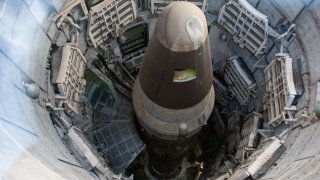It’s Time to Build the Nuclear Arsenal of the Twenty-First Century
Russia and China are expanding their nuclear arsenals. Meanwhile, American nuclear modernization is falling behind.
The international system is in chaos.
Earlier this summer, North Korea claimed to have launched a ballistic missile carrying multiple independent nuclear warheads. This test comes on the heels of an increasing number of cruise and ballistic missile tests, potentially enabled by Russian technical assistance as a quid pro quo for North Korean support for Russia’s war in Ukraine. Meanwhile, it is becoming increasingly clear that an Israel-Hezbollah war could become a reality, sending shockwaves across global energy markets.
These examples are part of a larger trend wherein American interests and the security of our closest allies are under siege by autocrats of Beijing, Moscow, and Pyongyang, who increasingly rely upon nuclear weapons to obviate their military failures or coerce neighbors. Indeed, Beijing and Moscow are also expanding their nuclear arsenals with the goal of achieving a nuclear advantage over the United States. This is why China and Russia have rejected or abandoned all recent attempts at nuclear arms control talks.
The United States must not let this stand. It is time for America to build the nuclear arsenal it needs to ensure that it can deter strategic attacks and great power war for the next half-century. The United States is currently making necessary replacements to legacy Cold War nuclear systems with newer versions, but these efforts are insufficient. Indeed, America’s nuclear arsenal is so old that our enemies may no longer fear it—and, indeed, may be emboldened by our struggles to modernize that very arsenal.
To achieve real deterrence in our increasingly threatening world, the United States must expand and diversify the strategic arsenal—the large nuclear weapons that are designed to prevent a nuclear attack on the American homeland—to ensure that neither Russia nor China is ever tempted to strike the American homeland.
Most urgently, the United States needs to expand and diversify its tactical nuclear arsenal significantly. Tactical nuclear weapons are smaller than strategic ones. They are designed to deter limited attacks against American interests and allies overseas and prevent a great power war. Strengthening America’s tactical nuclear arsenal is critically important, given that the United States—for all intents and purposes—retired its forward-deployed theater nuclear weapons at the end of the Cold War. At the same time, Russia and China have expanded or maintained their exceedingly large theater nuclear capabilities in the years since. If a nuclear war were to break out today, it is far more likely to do so in an overseas theater than from a “bolt out of the blue” attack on the U.S. homeland.
As such, over the next twelve months, the United States should upload three hundred Cold War-era tactical nuclear warheads from the ready reserve stockpile to existing medium and intermediate-range cruise missiles. Doing so would help deter Russian nuclear employment in Europe, a potential Chinese nuclear employment that results from an attempted invasion of Taiwan, and an increasingly assertive and capable nuclear-armed North Korea.
Such intermediate-range cruise missiles, armed with low-yield tactical nuclear warheads, could be forward deployed to the Pacific and European theaters.
Taking Cold War-era tactical warheads out of the reserve stockpile is not a perfect solution to the deteriorating security environment. Still, it is something that the United States can do in the immediate term to demonstrate its willingness to defend its interests and allies in the face of nuclear coercion. Considering that the nuclear modernization program won’t be completed for another decade at the soonest, it is imperative that the United States field capable and credible tactical nuclear weapons that can deter adversary nuclear aggression.
This is not a preferred option. No one wants more nuclear weapons in the world. However, delays in America’s nuclear modernization program require us to field a nuclear force in the immediate term that can stabilize a deteriorating security environment. Failure to do so will only embolden America’s adversaries and make nuclear war more likely. Without action now, the United States could become a second-tier nuclear power—behind both Russia and China—within ten to fifteen years. We’ve never known such a world, but we do know that it is a world where nuclear war is more likely.
Robert Peters is a Research Fellow for Nuclear Deterrence and Missile Defense in Heritage’s Allison Center for National Security. Follow him on X: @RealBobPeters.
Image: Pictor Pictures / Shutterstock.com.

